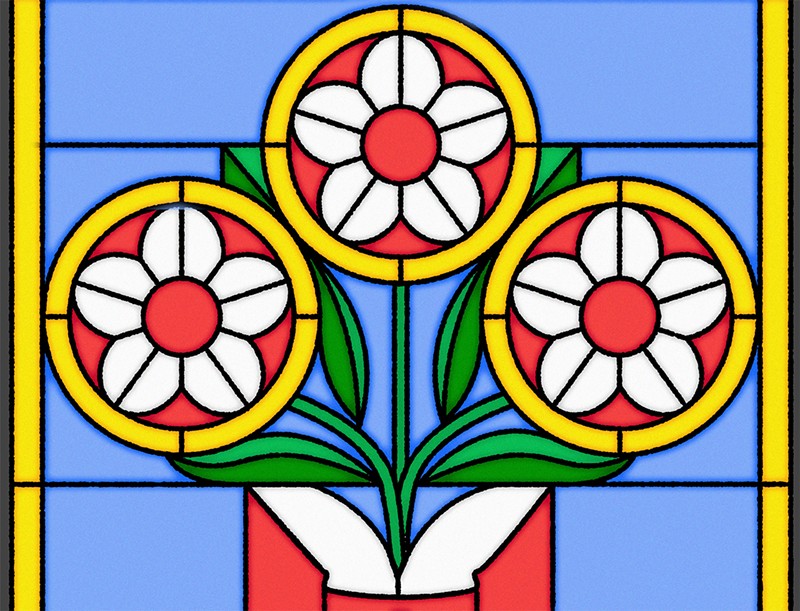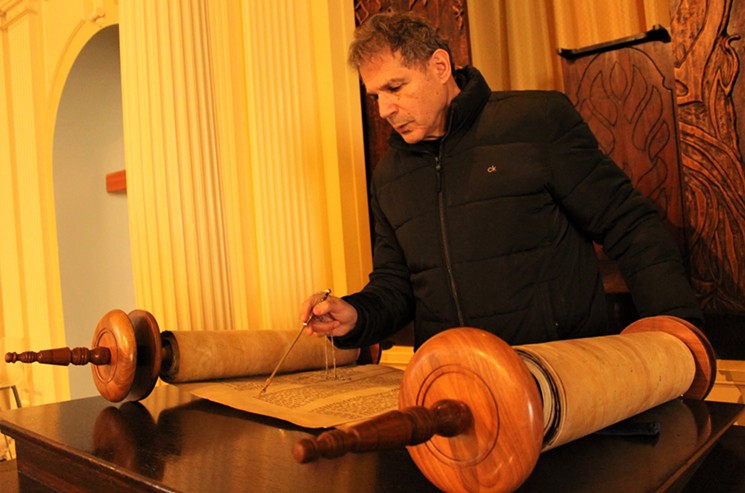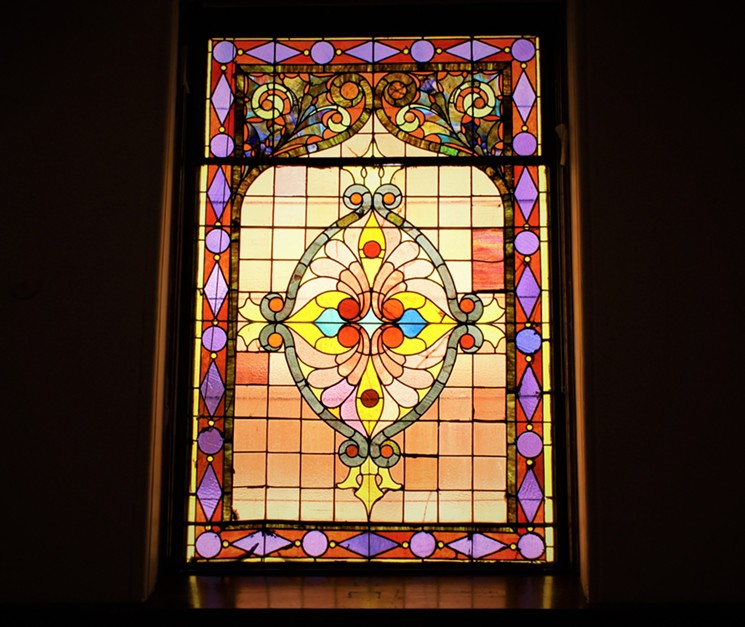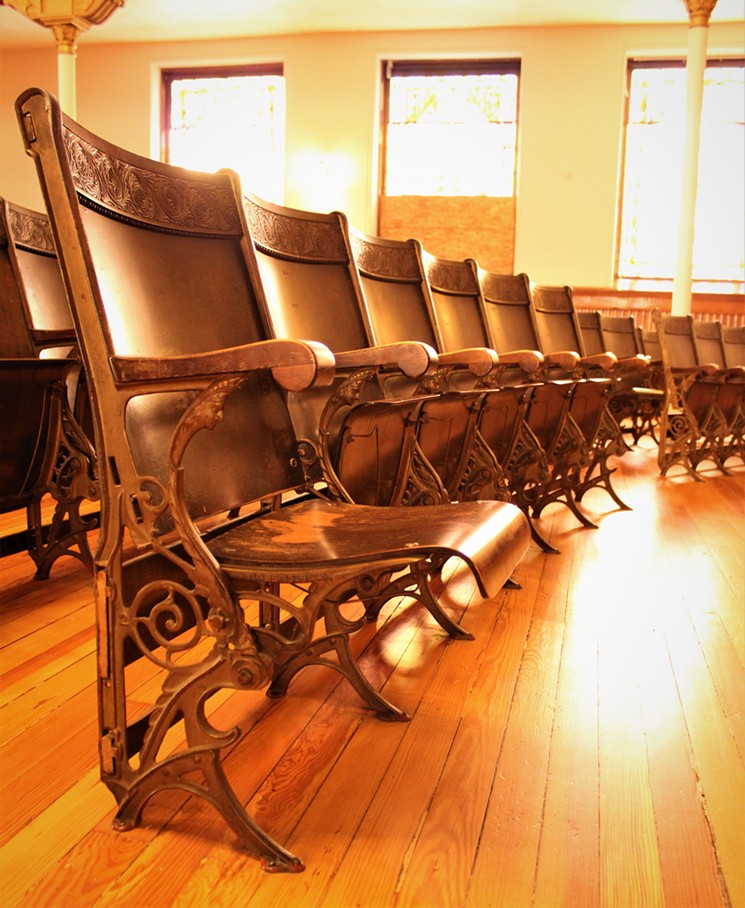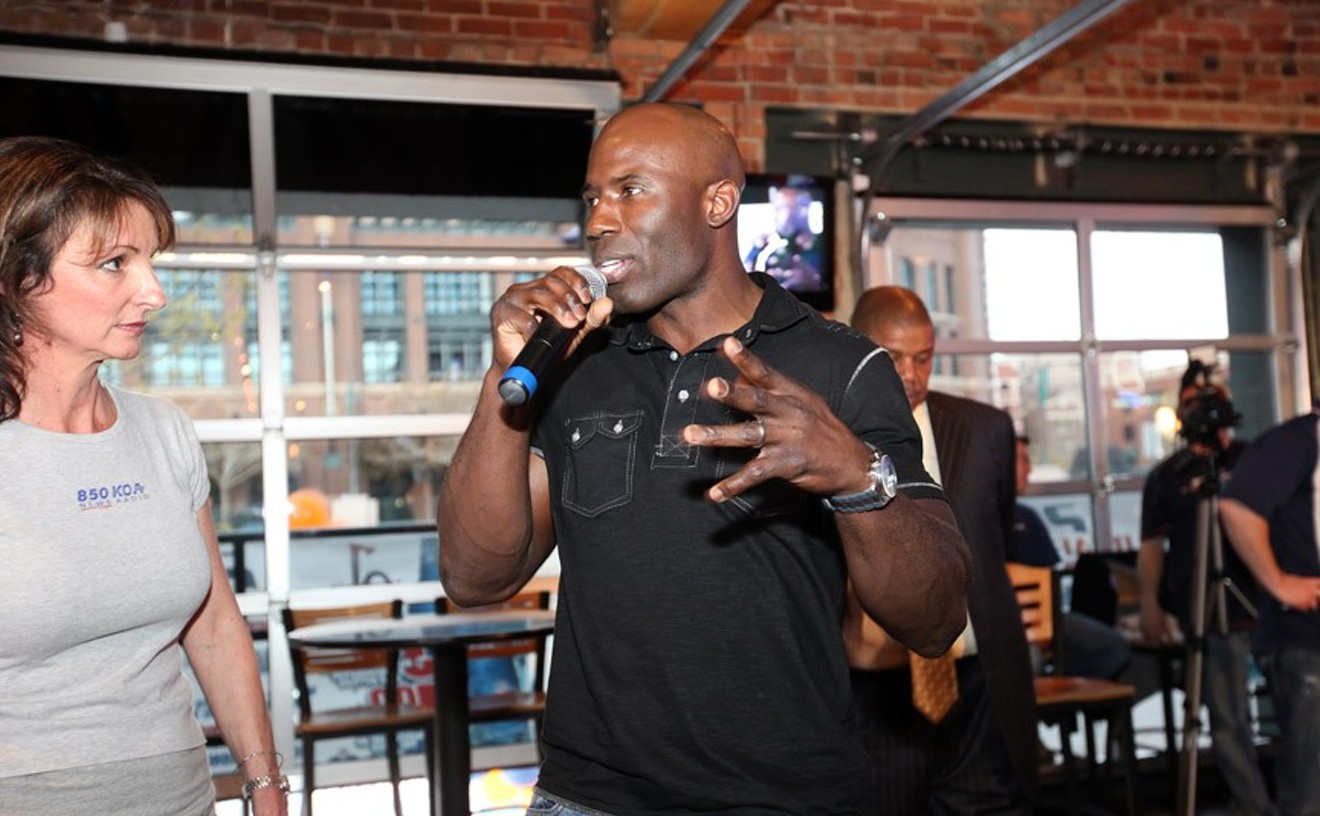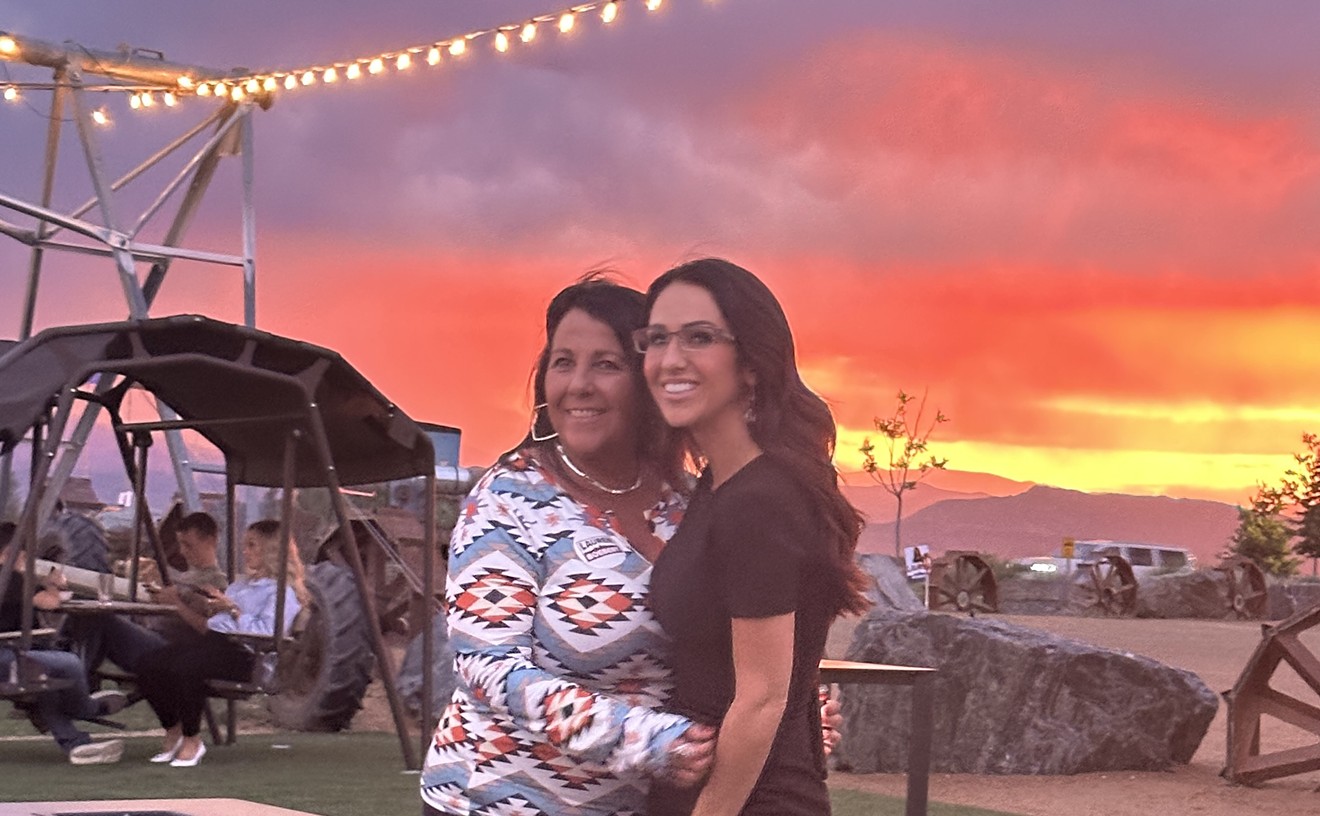On a recent Sunday morning, an upbeat band rocks the Bluebird Theater, where the bar gives out Voodoo doughnuts and the chairs fill up quickly. If you’ve been to a church before, it might take you a minute to realize that this is one, too.
Beacon is one of a dozen churches to take root in the Mile High City over the past few years, despite Denver’s reputation among those who establish new Christian churches — a process called “church planting” — as very difficult to church. While many Coloradans say they’re spiritual, they’re also not into religious organizations and would rather worship alone on a mountain than in a crowded pew.
“Denver has that reputation for killing church plants, but Jesus said something that was powerful. He said the harvest is plenty and the laborers are few. Twisted as this sounds, that makes me hopeful. It tells me that there is a lot of work to be done here,” says Pastor Charles Gilford III, who’s with the Potter’s House.
The Pew Research Center reports that 55 percent of Coloradans say they believe in God — roughly the same percentage who claim to pray every day — but only 18 percent of this state’s residents go to church weekly, and two-thirds of the population never go to church. One-third of all adults in the state are unaffiliated with a religion: 9 percent of them are atheist or agnostic, and 20 percent say they “don’t know” what they are...or don’t care.
Between low biblical literacy and even lower church attendance, Denver meets almost half of the criteria used to identify post-Christian, or secularized, cities by Barna, a faith-oriented data firm. Barna’s 2019 survey ranks Denver 32nd out of 100 cities, tied with Los Angeles and Omaha.
Between ski season, camping season and the Broncos, people just don’t make time for church in this state. But the challenges only inspire church-planting pastors.
“This is home, so if God is real and he did a thing in me, I want my home to know about it before anybody else,” says beacon’s pastor, CB Barthlow, who grew up in Broomfield.
“Has anyone told you Denver is a place church plants go to die?” he asks. “In the church- planting world, Denver is notorious for being the hardest ground to break. It’s just not the right culture for it. Even beyond just the politics of it, if you remove that from the equation, Denver has this amazing stuff on the weekends. In the winter we’re up in the mountains, in the fall we’re watching the Broncos, and in the summer we’re up in the mountains. It’s just not part of the culture. So lots and lots of people come here to plant churches, and it just doesn’t succeed.”
Standing on the Bluebird’s stage, Barthlow doesn’t look discouraged. Nor does he look like the stock image of a preacher. He rocks an undercut and works out. Instead of a collar, he wears a hip button-up, sleeves rolled back to show the tattoos progressing down his arms. He opens his Bible and starts to read. Barthlow says he’s never been a good reader, but he has no problem getting the Scripture’s meaning across: Come home. It’s a welcome message in a venue filled with transplants and refugees, millennials and elders, single folk and suburban couples, the homeless and the housed.
Before he preaches, Barthlow prays in the Bluebird’s green room. It’s the same place that he snorted cocaine ten years ago while performing as soul singer charlieBRAND.
“I was a musician and a drug addict at the same time,” Barthlow recalls. “I was living down here in the city with my wife and two kids, full-time gigging, and I was a crystal meth addict, so I was spending about $150 a day on dope — and she left, took the kids. I lost the house and the car and the career, and it was one of those white-light moments, when I was like, ‘Okay, I’m going to kill myself.’ Because when you’re an addict, suicide is the only way out.”
Barthlow planned it out on the weekly night when he had custody of his young sons. While they watched Finding Nemo. In the morning, he decided, he would take them to daycare and say goodbye, then come home, park in the garage and run a hose from the exhaust pipe into his car. But he drifted off during the movie and woke to the sound of his sons singing, “Just keep swimming, swimming, swimming.”
“I remember thinking, ‘That’s got to be God. That has got to be God speaking to me from the only persons I would listen to,’” Barthlow says.
The next day he checked into Cirque Lodge rehab in Sundance, Utah, and got clean. When he returned home, he joined the Potter’s House, a megachurch in southeast Denver, praying, serving and stacking chairs. A Potter’s House pastor encouraged him to try preaching, and Barthlow enrolled at Denver Seminary, earning a certificate there. He’s been sober since May 5, 2010.
Last year, Brave, a Cherry Hills church, decided to help Barthlow plant his first church. He chose the name “beacon” because of an old maritime tradition. Ships rarely landed on new shores in one piece, and according to legend, sailors would pile up the pieces of their broken wreck and light the pile on fire so the light could help guide others in.
“It just turned out like, ‘Oh, this is what I do. This is my thing,’” Barthlow explains. “Part of that journey, I knew, is that God wanted us to do something really unique for Denver, for people like me who are like, ‘I’m never going to church again, I’ve made a million mistakes, there’s no way I’m going to fit in with this crowd.’”
Lately, God has given him a new challenge: Through the COVID-19 disruption, beacon is temporarily suspending live meetings and instead posting virtual services on Sundays at 10 a.m. across its social media channels.
Pioneered by the apostle Paul and furthered by evangelical Christians, church planting is as old as the Bible.
But when Michael Walker decided to start a place of worship in Colorado, he didn’t call it church planting; he just considered it outreach. Now 74, Walker was raised Jewish in the Bronx and was “saved” by the Jesus freak movement of the ’70s, he says. At his mother’s suggestion, he visited Denver in 1982 to escape the New York rat race — and never looked back.
For several years, Walker commuted from Arvada to inner-city coffeehouses, homeless shelters and rehab centers, where he hosted services and held Bible studies. Then in 1991, he heard God say, “It’s time to unpack your bags in the city and start a church in the city. That’s how Church in the City began.”
He noticed a boarded-up Safeway on East Colfax Avenue at Josephine Street and asked the owner if he could rent it, only to find that a thrift store had already moved in. But the store, run by Veterans for the Homeless, gladly shared the space with the church. And when the thrift store went out of business that November, Church in the City signed on for a twenty-year lease.
At the time, the location was tough. “When we started out, the violence was crazy,” Walker recalls. “There were a lot of shootings in the early ’90s, so we reached out to gangs and opened our doors to those that nobody wanted to open up their doors to.”
As the church grew bigger, the neighborhood grew better. In 2008, a real estate developer bought the church out of its lease. It planned to build an apartment tower on the site, but that didn’t work out; today it’s home to the Carla Madison Recreation Center. Meanwhile, Walker used the developer’s payout to shepherd his congregation through the purchase of a former synagogue a block away, at 1580 Gaylord Street.
The synagogue building had been overrun by satanists, Walker remembers, with pentagrams painted in the entryway and demons over the pulpit. Through what he describes as a miracle, his congregation filled the building with Jerusalem stone, restored the stained-glass windows and even rescued the original light fixtures from the purgatory of storage.
Walker didn’t just successfully plant a church; Church in the City wound up transforming the community around it. One of the cornerstones of the church’s building is the geographic center of the neighborhood, and Church in the City Beth Abraham tries to be a cornerstone of activity. It’s been a greenhouse for numerous other church plants and seeds, offering space where twenty other ministries meet throughout the week. It also serves more than 28,000 meals to the needy each year and runs international humanitarian missions to Haiti and Guatemala.
Not all church plants take hold as powerfully. Over nearly four decades, Walker has seen countless churches come and go in Denver. “I’ve seen churches cave to the culture and embrace things that are not biblical,” he says, “and I’m not going to name names, but I’ve seen it a number of times, because there’s a pressure to put people in the seats to pay the bills, and our bills are high.”
But he has a suggestion for how to meet those challenges: “You have to be biblically relevant and not just culturally relevant.”
That isn’t easy these days. No matter how cool and progressive a church wants to be, it can’t celebrate lifestyles forbidden by the Bible, Walker says. Many evangelists struggle to find balance because they don’t want to turn people away, but they also don’t want to sanction biblically banned behaviors, such as drunkenness or gay marriage.
“Now, whomsoever may come — and we’re all sinners, we all fall short — but validating certain sin over others is where the pressure is for these churches that are starting,” Walker notes.
“I’ve come to the point where if we’re sharing the Bible and someone is offended by what it says, I say take it up with God. I don’t want to be some ‘religious institution’ or to do ‘religious activities.’ I want to do life-changing things and help people grow and become everything God created them to be.”
Churches may be exempt from taxes, but they are not immune to death.
Some churches die because their members leave. Some churches die because leadership changes, or fails to change. And at other times, the death of a church is too mysterious to explain as anything other than the act of a higher power.
“Sometimes God does remove his candle. Sometimes what was needed to take place in that moment succeeded, and he’s saying ‘Well done,’” explains Gilford at the Potter’s House. Though he has not been called to church-plant himself, he says, he mentors and supports new ministers on their many missions.
The Internal Revenue Service lists 209 tax-exempt organizations in Denver with “church” in their name, but since it’s not searchable by year, it’s difficult to gauge how many churches open and close each year. Several church buildings are currently for sale in the metro area, but this market forces many tenants, even churches, to rent rather than buy. Maintaining a building can simply be too costly for a congregation.
Athmar Park Church, for example, recently sold its property on West Mississippi and South Clay Street to the charismatic Victory Outreach of Denver; it had been listed for an asking price of $1.9 million. The building was built in 1955 for the Judson Memorial Baptist church.
Under its new ownership, the building will continue to house Athmar Park Church — a Baptist ministry with roots stretching back to 1880 — but other churches that rented space there have found other homes around the city, including Iglesia Vida Abundante, which will move in with Forefront Church in Harvey Park.
Pastor Mark Kraakevik planted his first church, the EDGE Colorado, in Littleton in 2006. From the start, he recognized this state’s unique challenges.
“I have lived in Minnesota and Iowa and Colorado, and I will say that in some ways, Colorado is the least churched,” he says. “Colorado is not a place where church is a starting point. I think it’s got some fascinating deeper roots to it, because if you think about the Wild West, it was miners, it was migrant workers building the railroad, it was prostitution, it was all that kind of stuff. … So all of a sudden, to say it’s weird that Colorado doesn’t have this religious background, well, historically it never was that kind of a place. All that is to say that it is a lot harder to get people to think about church, just because it’s not in their DNA.”
Even so, his church grew, eventually turning into New Life Fellowship and merging with Athmar Park Church in 2017.
“We’ve developed a mantra that the church is the people, not the building,” Kraakevik says. While the church is staying put, it is downsizing to make room for the new owner’s 350-member congregation. Kraakevik has been going through some of the things the church has collected and can’t keep, but can’t seem to give away, like a grand piano and boxes of hymnals. Still, he remains optimistic about the new arrangement.
“I think most church planters are optimists just by nature, and I definitely am,” he says. Even though a changing neighborhood presents new linguistic and cultural barriers, he never wants to lose the church-planting spirit that reaches beyond those already in the congregation.
“When churches go into management mode, they shift into, ‘Let’s just keep the people that are in the room happy,’” he notes. “And you lose that sense of there’s somebody out there that needs what we have, and we have to figure out how to reach them.”
Social-media-savvy ministers are reaching the unchurched online, recording entrepreneurial-minded podcasts and putting biblical verses on platforms like Instagram, where their feeds can have as many followers as those of non-secular influencers. In real life, there’s a growing trend of pastors casting aside formal titles and dress codes.
“Churches aren’t dying, they’re evolving. It’s like asking if the video entertainment industry died, or just Blockbuster,” points out Gilford, a millennial.
“Our outreach looks completely different,” he adds. “For us, it’s, ‘Hey, you’re having a hard time at work, let’s grab some food and talk.’ It’s much more intimate, much more personal.”
“Denver has a lot of churches,” says David Hermes, who’s in the process of planting Hope Valley Church in the Kirk of Highland building in northwest Denver. “It’s not like it needs more churches. The churches need to be consequential. It needs to matter that we’re there.”
Hope Valley Church is sponsored by Every Nation, a Tennessee-based church-planting powerhouse with hundreds of satellite sites established in 82 countries. Every January the entire global organization fasts together for five days. And throughout the year, Every Nation provides seed funding and guidance for new churches.
Raised in suburban Chantilly, Virginia, Hermes studied at a seminary, got married to Megan, then became a pastor at the church he’d gone to as a child. He thought he had the perfect life, with no ambitions to move anywhere else. “There has been a call for a long time, as people moved to urban centers,” Hermes recalls. “I remember thinking, ‘It’s a good thing someone else is going to do it!’”
But Hermes kept hearing the call to plant churches, so he did what he had been taught: He talked with his wife and prayed for an answer. When they looked at a map, they noticed that in all of North America, Denver was the city farthest from an Every Nation church. So last summer, the couple moved with their four kids to Stapleton.
“Denver rose up in our hearts because of the priority for Every Nation saying, ‘Hey, we’ve got churches on the East Coast and West Coast like a Fu Manchu, but there’s nothing in the middle of the country in terms of presence from our ministry,’” Hermes says. “We love other ministries, we work with other ministries, but we also know our calling is distinct.”
Every Nation specializes in youth and college ministries because, as David Houston, Every Nation director of churches, points out, most people make up their minds about Jesus by the age of 25.
“Just like me,” he says. “I got saved at twenty.” Houston planted his first church outside of the University of Florida in 1978, right after Playboy crowned it America’s best party school.
Every Nation also identified Denver as one of 138 cities with influential college campuses. “I think probably in the years to come I’ll be able to look back on it and say this is why God picked them for that area,” Houston says of the Hermes family. “I guess I could tell you why Denver is going to work for them: because Dave and Megan definitely have that pioneering spirit that we all think of when we think of the West.”
One of Hermes’s first missions in Denver was to find a home for Hope Valley Church. He came across what started as the Asbury United Methodist Episcopal Church, a Highland landmark built in 1894 from Manitou Springs sandstone and Castle Rock rhyolite. Although the structure has housed many churches over the years, as the Kirk it’s been hosting weddings and events. Hope Valley Church rents an office in the back and uses the stained-glass sanctuary on Sunday mornings.
A dozen members from other Every Nation churches moved to Denver to help Hermes plant Hope Valley Church, including youth minister Larry Tankson. Originally from Chicago, Tankson had gained ministry experience in Virginia, but has quickly learned that pastoring in an established church is very different from building a brand-new program. “I can easily get in front of a crowd, share the gospel, be engaging and be the fun guy, but now it’s, ‘Hey x, y and z has to get done before I can get to that,’” Tankson says. “My administrative muscles weren’t there. I have to discipline myself in a manner that is new for me.”
Hermes and his fellow church planters have spent the past few months figuring out how to reach potential church-goers in Denver. “We had these interest meetings that nobody showed up to. Okay, that’s great; people aren’t interested in being interested,” Hermes says, and chuckles. “In terms of goals, we’re all praying for people in our lives, we’re building relationships, and we all feel responsible to introduce more Jesus into more people’s lives.”
Hope Valley Church had hoped to formally launch services on Easter Sunday with the sermon “The Reappearing Church,” but rules against large gatherings to stop the spread of COVID-19 may change that.
Still, Hermes is undeterred. “This is what we do,” he says. “As much as Sunday is an important expression, that’s not limited to Sunday. Historically, the church has shined in times of danger and trouble for those in need.” With Denver Public Schools now closed, for example, Hermes says that his church is working with others in the community to get food to children who normally rely on their schools for meals.
Although Hermes is enjoying the mission, he points to his team as making the church-planting possible. And, of course, he thanks God.
“It isn’t about me,” he says. “It’s about something much bigger.”
Every Tuesday, Barthlow opens a tab at Hooked on Colfax and grabs a table at the coffeehouse, where he counsels congregants through their problems.
On a given day, those might range from a (legal) drug dealer considering a career switch to a lesbian couple struggling to square their love with Leviticus.
Once a week, Barthlow walks East Colfax and prays.
“I pray for our church, I pray for our city, I pray that our church can be in our city,” he says. “You know, if you sort of pay attention to what’s on the wall, a lot of this messaging is not celebratory of the biblical values that we stand for. But I don’t feel unwelcome, so I’m going to pray for the opportunity to come out and demonstrate the God that I serve, because he is love. I pray for the poor folks. I pray that God changes culture. I pray that the people who are stuck in addiction, I pray that God finds them and sets them free.”
Covering his bases, he then adds, “All of that stuff.”
Is it working? God only knows.
[
{
"name": "Air - MediumRectangle - Inline Content - Mobile Display Size",
"component": "12017618",
"insertPoint": "2",
"requiredCountToDisplay": "2",
"watchElement": ".fdn-content-body",
"astAdList": [
{
"adType": "rectangle",
"displayTargets": "mobile"
}
]
},{
"name": "Editor Picks",
"component": "17242653",
"insertPoint": "4",
"requiredCountToDisplay": "1",
"watchElement": ".fdn-content-body",
"astAdList": [
{
"adType": "rectangle",
"displayTargets": "desktop|tablet"
},{
"adType": "rectangle",
"displayTargets": "desktop|tablet|mobile"
}
]
},{
"name": "Inline Links",
"component": "18838239",
"insertPoint": "8th",
"startingPoint": 8,
"requiredCountToDisplay": "7",
"maxInsertions": 25
},{
"name": "Air - MediumRectangle - Combo - Inline Content",
"component": "17261320",
"insertPoint": "8th",
"startingPoint": 8,
"requiredCountToDisplay": "7",
"maxInsertions": 25,
"watchElement": ".fdn-content-body",
"astAdList": [
{
"adType": "rectangle",
"displayTargets": "desktop|tablet"
},{
"adType": "rectangle",
"displayTargets": "desktop|tablet|mobile"
}
]
},{
"name": "Inline Links",
"component": "18838239",
"insertPoint": "8th",
"startingPoint": 12,
"requiredCountToDisplay": "11",
"maxInsertions": 25
},{
"name": "Air - Leaderboard Tower - Combo - Inline Content",
"component": "17261321",
"insertPoint": "8th",
"startingPoint": 12,
"requiredCountToDisplay": "11",
"maxInsertions": 25,
"watchElement": ".fdn-content-body",
"astAdList": [
{
"adType": "leaderboardInlineContent",
"displayTargets": "desktop|tablet"
},{
"adType": "tower",
"displayTargets": "mobile"
}
]
}
]

